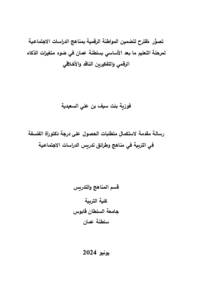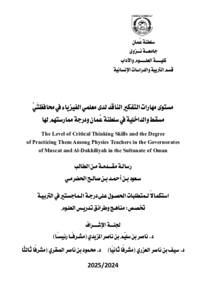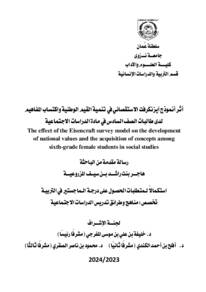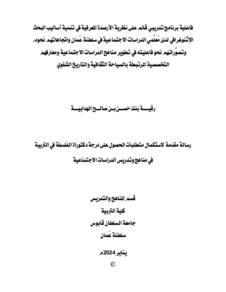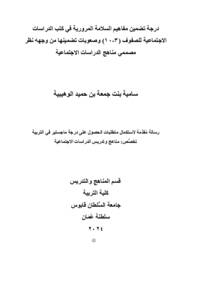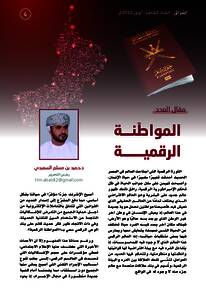وثيقة
تصوُّر مُقترح لتضمين المواطنة الرقمية بمناهج الدارسات الاجتماعية لمرحلة التعليم ما بعد الأساسي بسلطنة عمان في ضوء متغيرات الذكاء الرقمي والتفكيرين الناقد والأخلاقي.
المصدر
رسالة دكتوراة
عناوين أخرى
A proposed framework to include the digital citizenship into in social studies curricula of post-basic education in the Sultanate of Oman in light of the variables of digital intelligence and critical and ethical thinking
الدولة
عمان.
مكان النشر
مسقط
الناشر
جامعة السلطان قابوس.
ميلادي
2024
اللغة
العربية
الموضوع
نوع الرسالة الجامعية
رسالة دكتوراة
الملخص الإنجليزي
The study aimed to build a proposed framework to include the digital citizenship into social studies curricula of post-basic education in the Sultanate of Oman in light of the variables of digital intelligence and critical and ethical thinking. To achieve this, the descriptive approach was used in collecting data through three tools, namely: a measure of digital intelligence that included eight dimensions and (32) statements, a critical thinking test that included five subtests and (30) items distributed over (10) items, and a measure of ethical thinking that included five situations and (16) questions. After verifying the validity of the tools through apparent validity by presenting the tools to a group of experienced arbitrators, these tools were applied to an exploratory sample from outside the actual study sample, and the internal correlation indicators and factorial validity were calculated, as well as the stability of the internal consistency was verified using the Cronbach alpha equation. The digital intelligence scale reached (0.857), the critical thinking test reached (0.752), while the ethical thinking scale reached (0.756). The tools were then applied to the actual sample, which amounted to (938) male and female students in the governorates of Muscat, North and South Al Batinah. The study found that the overall levels of digital intelligence and critical and ethical thinking among the study sample were moderate. The results also showed statistically significant differences at a significance level of 0.050 in favor of females according to the gender variable, in favor of the advanced mathematics stream according to the elective subjects variable, and in favor of informed parents according to the variable of parents’ knowledge of their children’s online accounts, in favor of an average daily use of the internet of 1 to 3 hours in digital intelligence, and in favor of an average daily use of the internet of 4 to 5 hours in critical thinking, differences also appeared between daily internet use of 1 to 3 hours and 6 hours and more in favor of 1-3 hours, and also between the two periods of 4-5 hours and 6 hours and more in favor of 4-5 hours in ethical thinking according to the variable average hours of daily use of the internet, while no statistically significant differences appeared at the significance level. 0.050 according to the variable of social networking sites or active chat accounts owned by students. The results also showed the existence of a weak and significant relationship between the level of digital intelligence and the level of critical thinking, and the existence of a very weak and significant relationship between the level of digital intelligence and the level of ethical thinking. In light of these results and based on the established literature and previous studies, the study presented a proposed framework for including digital citizenship in the social studies curricula for the post-basic education stage in the Sultanate of Oman in light of the variables of digital intelligence and critical and ethical thinking using the systems analysis method. This framework consists of material, human and symbolic inputs and processes represented in various strategies and activities to implement the proposed framework, and clarify the outcomes, which is the goal that the proposed framework seeks to achieve. The study recommended adopting the proposed framework and raising awareness of the importance of developing digital citizenship among young people to succeed in dealing with the digital world.
الملخص العربي
هدفت الدراسة إلى بناء تصور مقترح لتضمين المواطنة الرقمية في مناهج الدراسات الاجتماعية للتعليم ما بعد الأساسي في سلطنة عمان، في ضوء متغيرات الذكاء الرقمي والتفكيرين الناقد والأخلاقي. ولتحقيق ذلك استُخدم المنهج الوصفي في جمع البيانات من خلال ثلاث أدوات، هي: مقياس للذكاء الرقمي، تضمن ثمانية محاور و(32) عبارة، واختبار للتفكير الناقد، تضمن خمسة اختبارات فرعية و(30) بندًا موزعة على (10) فقرات، ومقياس للتفكير الأخلاقي، تضمن خمسة مواقف و(16) سؤالًا. وبعد التحقق من صدق الأدوات، من خلال الصدق الظاهري بعرض الأدوات على مجموعة من المحكمين من ذوي الخبرة، طُبقت على عينة استطلاعية من خارج عينة الدراسة الفعلية لحساب مؤشرات الارتباط الداخلي والصدق العاملي، والتحقق من ثبات الاتساق الداخلي باستخدام معادلة ألفا لكرومباخ، حيث بلغ في مقياس الذكاء الرقمي (0.857)، وفي اختبار التفكير الناقد (0.752)، وفي مقياس التفكير الأخلاقي (0.756). ثم طُبقت الأدوات على العينة الفعلية، والتي بلغت (938) طالبًا وطالبة في محافظات مسقط وشمال وجنوب الباطنة.
وتوصلت الدراسة إلى أن مستويات الذكاء الرقمي والتفكيرين الناقد والأخلاقي الكلية لدى عينة الدراسة جاءت متوسطة، كما أظهرت النتائج فروقًا ذات دلالة إحصائية عند مستوى دلالة 0.050 في هذه المستويات لصالح الإناث حسب متغير الجنس، ولصالح قسم الرياضيات المتقدمة حسب متغير المواد الاختيارية، ولصالح أولياء الأمور المُطلعين حسب متغير اطلاع أولياء الأمور على حسابات أبنائهم عبر الإنترنت، ولصالح متوسط استخدام يومي للإنترنت من 1 إلى 3 ساعات في مستوى الذكاء الرقمي، ولصالح متوسط استخدام يومي للإنترنت من 4 إلى 5 ساعات في مستوى التفكير الناقد. كما أظهرت النتائج فروقًا بين استخدام الإنترنت اليومي من 1 – 3 ساعات ومن 6 ساعات وأكثر لصالح من 1 – 3 ساعات، وكذلك بين الفترتين من 4 – 5 ساعات و6 ساعات وأكثر لصالح من 4 – 5 ساعات في مستوى التفكير الأخلاقي، حسب متغير متوسط ساعات الاستخدام اليومي للإنترنت، بينما لم تظهر فروقًا ذات دلالة إحصائية عند مستوى دلالة 0.050 حسب متغير حسابات مواقع التواصل الاجتماعي أو الدردشة المفعلة التي يملكها الطلبة. كما أشارت النتائج إلى وجود علاقة ضعيفة ودالة إحصائيًا بين مستوى الذكاء الرقمي ومستوى التفكير الناقد، ووجود علاقة ضعيفة جدًا ودالة بين مستوى الذكاء الرقمي ومستوى التفكير الأخلاقي.
وبناءً على النتائج وبالاعتماد على الأدب التربوي والدراسات السابقة، قدمت الدراسة تصورًا مقترحًا لتضمين المواطنة الرقمية بمناهج الدراسات الاجتماعية لمرحلة التعليم ما بعد الأساسي بسلطنة عمان، في ضوء متغيرات الذكاء الرقمي والتفكيرين الناقد والأخلاقي، باستخدام أسلوب تحليل النظم. يتكون هذا التصور من مدخلات مادية وبشرية ورمزية، وعمليات تمثلت في استراتيجيات وأنشطة متنوعة لتنفيذ التصور المقترح، وتوضيح للمخرجات، وهو الهدف الذي يسعى التصور المقترح لتحقيقه. وأوصت الدراسة بتبني التصور المقترح، والتوعية بأهمية تنمية المواطنة الرقمية لدى النشء للنجاح في التعامل مع العالم الرقمي.
وتوصلت الدراسة إلى أن مستويات الذكاء الرقمي والتفكيرين الناقد والأخلاقي الكلية لدى عينة الدراسة جاءت متوسطة، كما أظهرت النتائج فروقًا ذات دلالة إحصائية عند مستوى دلالة 0.050 في هذه المستويات لصالح الإناث حسب متغير الجنس، ولصالح قسم الرياضيات المتقدمة حسب متغير المواد الاختيارية، ولصالح أولياء الأمور المُطلعين حسب متغير اطلاع أولياء الأمور على حسابات أبنائهم عبر الإنترنت، ولصالح متوسط استخدام يومي للإنترنت من 1 إلى 3 ساعات في مستوى الذكاء الرقمي، ولصالح متوسط استخدام يومي للإنترنت من 4 إلى 5 ساعات في مستوى التفكير الناقد. كما أظهرت النتائج فروقًا بين استخدام الإنترنت اليومي من 1 – 3 ساعات ومن 6 ساعات وأكثر لصالح من 1 – 3 ساعات، وكذلك بين الفترتين من 4 – 5 ساعات و6 ساعات وأكثر لصالح من 4 – 5 ساعات في مستوى التفكير الأخلاقي، حسب متغير متوسط ساعات الاستخدام اليومي للإنترنت، بينما لم تظهر فروقًا ذات دلالة إحصائية عند مستوى دلالة 0.050 حسب متغير حسابات مواقع التواصل الاجتماعي أو الدردشة المفعلة التي يملكها الطلبة. كما أشارت النتائج إلى وجود علاقة ضعيفة ودالة إحصائيًا بين مستوى الذكاء الرقمي ومستوى التفكير الناقد، ووجود علاقة ضعيفة جدًا ودالة بين مستوى الذكاء الرقمي ومستوى التفكير الأخلاقي.
وبناءً على النتائج وبالاعتماد على الأدب التربوي والدراسات السابقة، قدمت الدراسة تصورًا مقترحًا لتضمين المواطنة الرقمية بمناهج الدراسات الاجتماعية لمرحلة التعليم ما بعد الأساسي بسلطنة عمان، في ضوء متغيرات الذكاء الرقمي والتفكيرين الناقد والأخلاقي، باستخدام أسلوب تحليل النظم. يتكون هذا التصور من مدخلات مادية وبشرية ورمزية، وعمليات تمثلت في استراتيجيات وأنشطة متنوعة لتنفيذ التصور المقترح، وتوضيح للمخرجات، وهو الهدف الذي يسعى التصور المقترح لتحقيقه. وأوصت الدراسة بتبني التصور المقترح، والتوعية بأهمية تنمية المواطنة الرقمية لدى النشء للنجاح في التعامل مع العالم الرقمي.
قالب العنصر
الرسائل والأطروحات الجامعية

